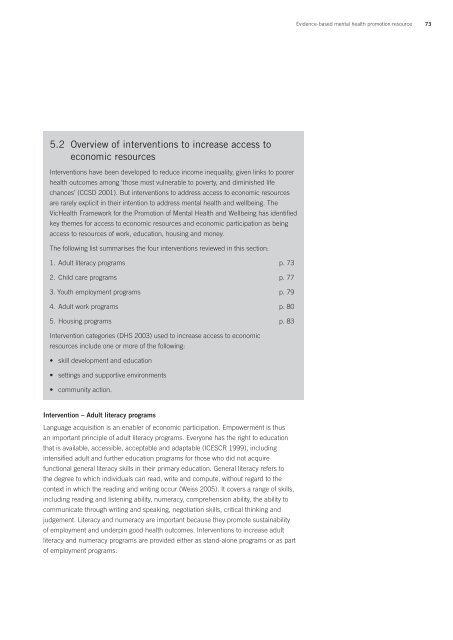<strong>Evidence</strong>-<strong>based</strong> <strong>mental</strong> <strong>health</strong> <strong>promotion</strong> <strong>resource</strong>735.2 Overview of interventions to increase access toeconomic <strong>resource</strong>sInterventions have been developed to reduce income inequality, given links to poorer<strong>health</strong> outcomes among ‘those most vulnerable to poverty, and diminished lifechances’ (CCSD 2001). But interventions to address access to economic <strong>resource</strong>sare rarely explicit in their intention to address <strong>mental</strong> <strong>health</strong> and wellbeing. TheVicHealth Framework for the Promotion of Mental Health and Wellbeing has identifiedkey themes for access to economic <strong>resource</strong>s and economic participation as beingaccess to <strong>resource</strong>s of work, education, housing and money.The following list summarises the four interventions reviewed in this section:1. Adult literacy programs p. 732. Child care programs p. 773. Youth employment programs p. 794. Adult work programs p. 805. Housing programs p. 83Intervention categories (DHS 2003) used to increase access to economic<strong>resource</strong>s include one or more of the following:• skill development and education• settings and supportive environments• community action.Intervention – Adult literacy programsLanguage acquisition is an enabler of economic participation. Empowerment is thusan important principle of adult literacy programs. Everyone has the right to educationthat is available, accessible, acceptable and adaptable (ICESCR 1999), includingintensified adult and further education programs for those who did not acquirefunctional general literacy skills in their primary education. General literacy refers tothe degree to which individuals can read, write and compute, without regard to thecontext in which the reading and writing occur (Weiss 2005). It covers a range of skills,including reading and listening ability, numeracy, comprehension ability, the ability tocommunicate through writing and speaking, negotiation skills, critical thinking andjudgement. Literacy and numeracy are important bec<strong>au</strong>se they promote sustainabilityof employment and underpin good <strong>health</strong> outcomes. Interventions to increase adultliteracy and numeracy programs are provided either as stand-alone programs or as partof employment programs.
74 <strong>Evidence</strong>-<strong>based</strong> <strong>mental</strong> <strong>health</strong> <strong>promotion</strong> <strong>resource</strong>Health literacy is one of the main forms of literacy. It is considered to include knowledgeabout <strong>health</strong> and <strong>health</strong> care; the ability to find, understand, interpret and communicate<strong>health</strong> information; and the ability to seek appropriate care and make critical <strong>health</strong>decisions, including the ability to comprehend and act on social and economicdeterminants of <strong>health</strong>. And it is believed to improve community empowerment. Other‘literacies’ include computer literacy, cultural literacy, media literacy and scientificliteracy (Rootman & Ronson 2002).There are strong links among education, employment and <strong>health</strong>. The InternationalAdult Literacy Survey (OECD & Statistics Canada 2000), a comparative study of 12Organisation for Economic Cooperation and Development countries, found a directassociation between literacy and labour market experience. People with low literacycompetency receive lower levels of income and experience unemployment for longerperiods, compared with people who have higher levels of literacy; further, they are lesslikely to secure stable and secure employment (Lamb & McKenzie 2001; Marks &Fleming 1998; Rahmani, Crosier & Pollack 2002). Illiteracy has a major negative impacton employment and <strong>health</strong>.Help with literacy skills appears to be needed among immigrant groups, with theprovision of language and literacy skills for new arrivals helping bridge social capital.Classes to assist immigrant people with language skills in the principle language of acountry are an important factor in their economic and social integration (Rahmani,Crosier & Pollack 2002).Population group/settingThese interventions target adults of all ages in a range of community-<strong>based</strong> settings,particularly those people with low general primary or secondary education, and non-English speaking new arrivals. Programs have been specifically developed for immigrantwomen, who are likely to be isolated by housework and child care responsibilities.Bec<strong>au</strong>se men from non-English speaking backgrounds are known to be disadvantagedin employment, it follows that both men and women are population groups of interest.EffectivenessThe relationship between literacy, life opportunities, employment and <strong>mental</strong> <strong>health</strong> andwellbeing is proven to be strong (Rahmani, Crosier & Pollack 2002; Rootman & Ronson2002). Locally delivered programs, funded in the not-for-profit sector, are cost-effective(Rahmani, Crosier & Pollack 2002). While literacy programs are rarely evaluated interms of <strong>mental</strong> <strong>health</strong> <strong>promotion</strong> outcomes, participation in adult literacy programshas a positive effect on self-concept, self-esteem and self-image (Beder 1999). Thedirect and indirect effects of literacy on <strong>health</strong> suggest the importance of relationshipsbetween literacy and other determinants of <strong>health</strong>, including early childhood, ageing,personal skills and capacity, gender, age and culture (Rootman & Ronson 2002).



